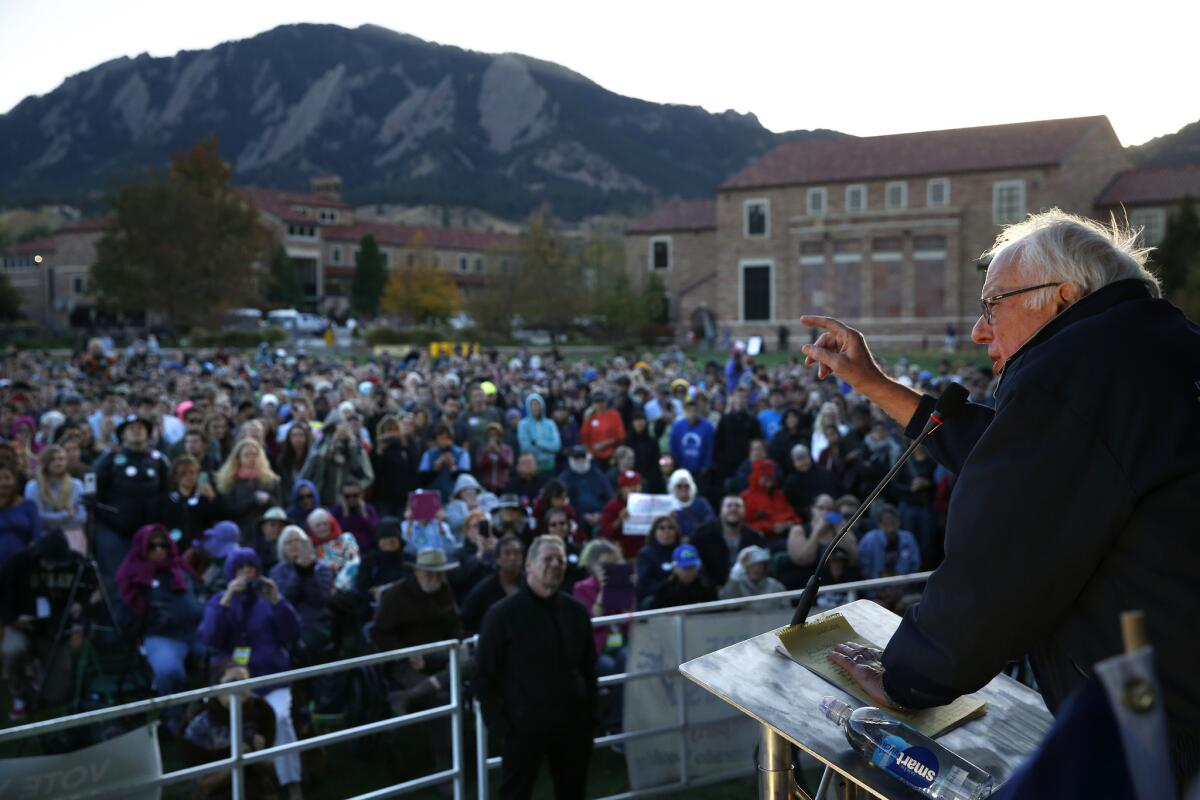Marijuana, assisted suicide, fracking — Colorado’s freewheeling initiative days may soon be over

- Share via
Reporting from Denver — Come election season, Colorado voters routinely face an eclectic array of ballot initiatives that has made it a national laboratory for big ideas.
This is the place that first granted women the right to vote and more than a century later legalized marijuana. And this year, voters will choose whether the state will launch the nation’s first universal healthcare system and allow the terminally ill to end their own lives.
But while this freewheeling exercise in citizen democracy is invigorating to many, others believe it has gone too far.
So they introduced Amendment 71 which many fear will change everything.
Backed by a campaign called Raise the Bar, the measure would make it significantly harder to amend the state Constitution. It expands the area from which voter signatures must be gathered, while requiring future initiatives to pass by 55% of the vote rather than a simple majority.
This ballot measure is going to ensure that our constitution is not held captive by the whims of the day
— Colorado Gov. John Hickenlooper
“This may be arcane to most people, but for those involved in the initiative process, it’s a game-changer,” said Seth Masket, political science professor at the University of Denver.
Critics call it a naked power grab that would kill efforts to amend the Constitution by citizens, leaving it in the hands of the rich and powerful instead.
Indeed, the amendment is heavily supported by the oil and gas industry which has been repeatedly targeted by anti-fracking initiatives. But a number of elected officials are also behind it, including Democratic Gov. John Hickenlooper.
“This ballot measure is going to ensure that our constitution is not held captive by the whims of the day,” Hickenlooper said.
A small army of disparate interests have mobilized against it, including abortion rights groups, gun rights organizations, evangelicals, environmentalists and Tea Party activists.
But they worry it may be too late.
“Right now, it’s a pretty uphill battle because 71 is being funded by the oil and gas industry with mountains of disposable income,” said Tim Hoover, spokesman for the Colorado Fiscal Institute, a left-leaning policy center focusing on economics. “It’s one thing to raise the bar and another to launch it into outer space.”
Jon Caldara, president of the Independence Institute, a libertarian think tank, said Amendment 71 is built on a faulty premise.
“Anyone who says it’s easy to change the Colorado Constitution is either incredibly wealthy or they never tried,” he said. “First you have to get it on the ballot and then get it past voters. The history of initiatives in Colorado is that most are overwhelmingly voted down.”
Even worse, he said, the amendment would destroy the ability of voters to rein in government.
“State law is where the government tells us what to do and the Constitution is where we tell politicians what to do,” he said. “What you have on 71 is overwhelmingly industry groups trying to protect themselves from citizens passing things they don’t like.”
The director of the Raise the Bar campaign, Josh Penry, doesn’t dispute that business is a major player. That’s not surprising, he said, because they are so often the targets of initiatives.
“This has become a cottage industry of special interests that use the amendment process to raise money and consolidate their political power,” said Penry, a Republican and former minority leader of the Colorado Senate. “Amendment 71 requires those seeking to amend the Constitution to collect signatures in each of the 35 Senate districts as opposed to setting up a table in Boulder or Denver and doing it all there.”
Under the current system, petitioners must gather signatures equal to 5% of the votes cast in the most recent election for secretary of state. In 2016, that would have been about 98,000 signatures. Amendment 71 would make petitioners collect at least 2%, or about 2,000 signatures, in each of the 35 state Senate districts, rather than in just a few metropolitan areas.
Penry believes that’s still easier than most other states. He said requiring 55% of voters to pass an initiative is necessary.
“There is a strong sentiment that the Constitution exists to protect our rights against the mob, from the passions of the hour, so we think it should require more than 50% plus one to change it,” he said.
Opponents point out that the 55% requirement would have sunk the 1893 initiative giving Colorado women the right to vote. That passed by 54.7%.
The Denver Post has editorialized against the amendment. It expressed sympathy for the 55% standard but called collecting signatures in 35 districts a “Herculean effort.”
“The reason is that the system is costly, as signature gathering can easily cost $1 million or more. Next come the pricey legal battles that pop up when signatures are contested,” the newspaper said. “All that before a campaign spends a dime on getting out the message.”
Masket, the political science professor, said having too many initiatives on the ballot can overwhelm voters.
“Colorado has the most or nearly the most initiatives of any state because it’s easy to get something on the ballot,” he said. “Sometimes there are multiple initiatives on the same subject.”
That has a downside.
“If there are too many and they are too complex, voters often vote down everything,” he said.
ALSO
DEA backs off a ban on kratom, a plant used to treat opioid addiction
Yes, an after-school Satan Club could be coming to your kid’s grade school
These 76-year-old twins have grown pot for decades. Here’s why they oppose legalization
More to Read
Sign up for Essential California
The most important California stories and recommendations in your inbox every morning.
You may occasionally receive promotional content from the Los Angeles Times.










